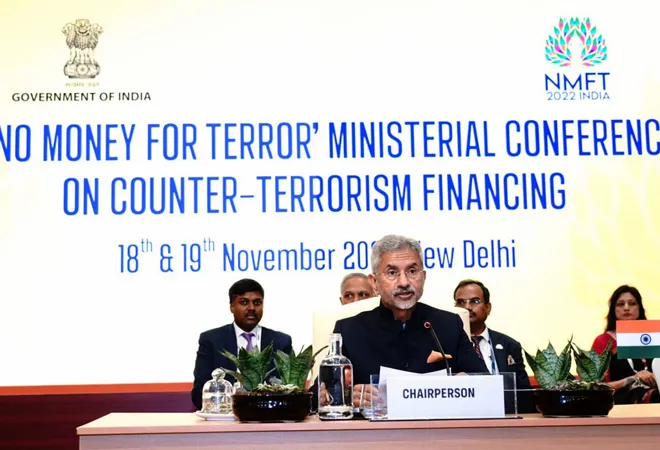Within a month, India hosted two forums to push forward a globally flailing discourse in countering terrorism. First, the United Nations (UN) Security Council’s Counter-Terrorism Committee (CTC) met in Mumbai and Delhi in October. Second, the No Money for Terrorism conference took place in Delhi last week to build a consensus against terror financing. Addressing the second gathering, Union home minister Amit Shah pushed States to rise above geopolitical one-upmanship and tackle terrorism as a united front.
Amid the rise of inflexion points over the past few years — ranging from a botched United States (US) withdrawal of troops from Afghanistan, Covid-19, and the war in Ukraine — the push against terrorism has suffered. The killing of al-Qaeda chief Ayman al-Zawahiri in July garnered a muted response in public discourse, showcasing a significant move away from the post-9/11 “war on terror” narrative around western foreign policy.
Any regional dialogue against terrorism in South Asia is almost non-existent as formats such as the South Asian Association for Regional Cooperation remain in deep freeze due to the India-Pakistan rivalry.
The above vacuum is what India seeks to exploit, attempting to bring terrorism back as a central security agenda. These efforts are not new for Delhi, which previously, particularly in the pre-9/11 era, tried and failed to bring attention to Pakistan’s sponsorship of cross-border terrorism as State policy. Nonetheless, questions remain whether large, multilateral formats are effective for such endeavours beyond platitudes and discourse or newer, “minilateral” or regional formats are a new way forward.
Systemic logjams at the UN make it difficult to remain the premier forum for such debates. Recently, Prime Minister Narendra Modi, at the G20 Summit, alluded to the failures of the UN to tackle major global issues, giving more compact formats such as the G20, and Shanghai Cooperation Organisation, among others, increased leverage.
However, these frustrations also raise interesting questions on what are the new, more viable, and more effective international platforms where an action-oriented response to terrorism can be designed. Interestingly, and perhaps even more challengingly, the answers may lie in intra-regional forums. For example, any regional dialogue against terrorism in South Asia is almost non-existent as formats such as the South Asian Association for Regional Cooperation remain in deep freeze due to the India-Pakistan rivalry. This, even though two of the most significant terror attacks conducted by pro-Islamic State (IS) sympathisers, were in Bangladesh (2016) and Sri Lanka (2019). The Lanka attacks remain an enigma, with little information released. No dedicated dialogue in South Asia has taken place on the return of the Taliban to Afghanistan, in contrast to several such talks among Central Asian States. From New Delhi’s perspective, even if it sees involving Pakistan as futile, not rallying other neighbours, even in public discourse, remains a missing ace in its deck of diplomacy cards.
West Asia and its rivalries among Israel, the Arab States and Iran offer an interesting glimpse into prioritising regional dialogue over multilateral agendas. Despite differences, for example, Israel has had back-channel dialogues with many Arab States before the signing of the Abraham Accords in 2020. Recently, Saudi Arabia and Iran held talks (hosted by Iraq) to minimise the chances of large-scale conflict and discuss ongoing conflict zones such as Yemen. These regional outreach programmes may not always work, but more intricate regional dialogue across the table, instead of going through a western capital or the UN, is increasingly becoming a preferred conversation mode.
The US cutting a deal with the Taliban has opened a new potential of an off-ramp for many nonState militant groups.
The future of counterterrorism has been disrupted by the events in Afghanistan. The US cutting a deal with the Taliban has opened a new potential of an off-ramp for many nonState militant groups. Recent reports of former al-Qaeda affiliate in Syria, Hay’at Tahrir Al Sham, arresting one of Europe’s most wanted criminals in Syria and deporting him to Italy, show new levels of engagement between certain groups and the West.
As a nation impacted heavily by terrorism, India has done well to continue to bring the world back to focus on the issue that was receding from global headlines. However, its ability to galvanise the international community on this issue will, to a large extent, determine how effective the worldwide response of crafting a counterterror architecture that meets the needs of our times is.
This commentary originally appeared in Hindustan Times.
The views expressed above belong to the author(s). ORF research and analyses now available on Telegram! Click here to access our curated content — blogs, longforms and interviews.




 PREV
PREV


